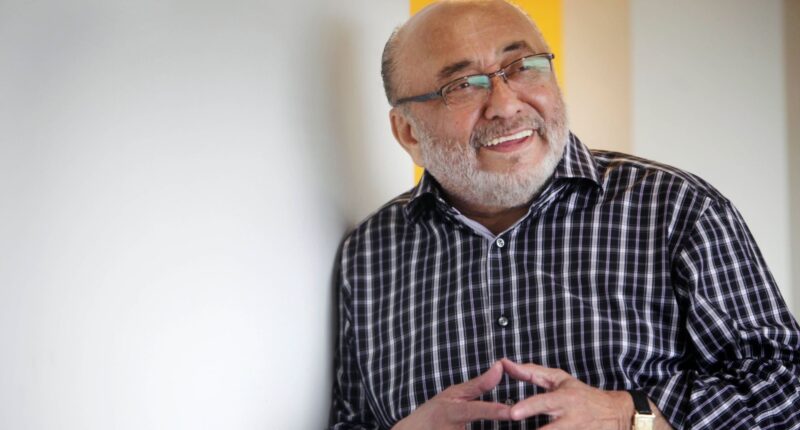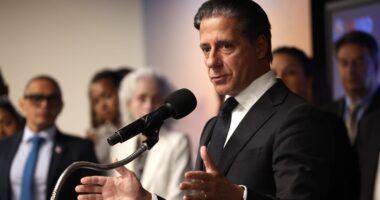Share this @internewscast.com
Eddie Palmieri, the avant-garde musician who was one of the most innovative artists of rumba and Latin jazz, has died. He was 88.
Fania Records announced Palmieri’s death Wednesday evening.
The pianist, composer and bandleader was the first Latino to win a Grammy Award and would win seven more over a career that spanned nearly 40 albums.
Eddie Palmieri was born in Spanish Harlem, New York, on December 15, 1936, during an era when music offered an escape from the ghetto. He started piano lessons early on, inspired by his renowned brother Charlie Palmieri. However, at 13, he switched to playing timbales in his uncle’s orchestra, driven by a fascination with drums.
Eventually, Palmieri returned to his true calling, the piano. He once remarked on his website, “I’m a frustrated percussionist, so I take it out on the piano,” reflecting his enduring passion for rhythm.
He earned his first Grammy in 1975 with the album “The Sun of Latin Music” and continued sharing his art well into his 80s, even performing through the coronavirus pandemic via livestreams.
In a 2011 conversation with The Associated Press, asked about his future goals, Palmieri responded with characteristic modesty and humor: “Learning to play the piano well. … Being a piano player is one thing. Being a pianist is another.”
Palmieri’s early career and Grammy triumph
During the 1950s, Palmieri explored tropical music as a pianist with the Eddie Forrester Orchestra. He later joined bands led by Johnny Seguí and Tito Rodríguez before establishing his own ensemble, La Perfecta, in 1961 with trombonist Barry Rogers and vocalist Ismael Quintana.
La Perfecta stood out as the first band to replace trumpets with a trombone section in Latin music, creating a distinct sound that quickly elevated them to the level of groups like Machito and Tito Rodríguez’s, becoming a staple of the era’s Latin music scene.
Palmieri produced several albums on the Alegre and Tico Records labels, including the 1971 classic “Vámonos pa’l monte,” with his brother Charlie as guest organist. Charlie Palmieri died in 1988.
Eddie’s unconventional approach would surprise critics and fans again that year with the release of “Harlem River Drive,” in which he fused Black and Latin styles to produce a sound that encompassed elements of salsa, funk, soul and jazz.
Later, in 1974, he recorded “The Sun of Latin Music” with a young Lalo Rodríguez. The album became the first Latin production to win a Grammy.
The following year he recorded the album “Eddie Palmieri & Friends in Concert, Live at the University of Puerto Rico,” considered by many fans to be a salsa gem.
A global ambassador for Latin Jazz
In the 1980s, he won two more Grammy Awards, for the albums “Palo pa’ rumba” (1984) and “Solito” (1985). A few years later, he introduced the vocalist La India to the salsa world with the production “Llegó La India vía Eddie Palmieri.”
Palmieri released the album “Masterpiece” in 2000, which teamed him with the legendary Tito Puente, who died that year. It was a hit with critics and won two Grammy Awards. The album was also chosen as the most outstanding production of the year by the National Foundation for Popular Culture of Puerto Rico.
During his long career, he participated in concerts and recordings with the Fania All-Stars and Tico All-Stars, standing out as a composer, arranger, producer, and orchestra director.
In 1988, the Smithsonian Institute recorded two of Palmieri’s concerts for the catalog of the National Museum of American History in Washington.
Yale University in 2002 awarded him the Chubb Fellowship Award, an award usually reserved for international heads of state, in recognition of his work in building communities through music.
In 2005, he made his debut on National Public Radio as the host of the program “Caliente,” which was carried by more than 160 radio stations nationwide.
He worked with renowned musicians such as timbalero Nicky Marrero, bassist Israel “Cachao” López, trumpeter Alfredo “Chocolate” Armenteros, trombonist Lewis Khan, and Puerto Rican bassist Bobby Valentín.
In 2010, Palmieri said he felt a bit lonely musically due to the deaths of many of the rumberos with whom he enjoyed playing with.
As a musical ambassador, he brought salsa and Latin jazz to places as far afield as North Africa, Australia, Asia and Europe, among others.
___
Former Associated Press Writer Sigal Ratner-Arias is the primary author of this obituary.
Copyright © 2025 by The Associated Press. All Rights Reserved.
















